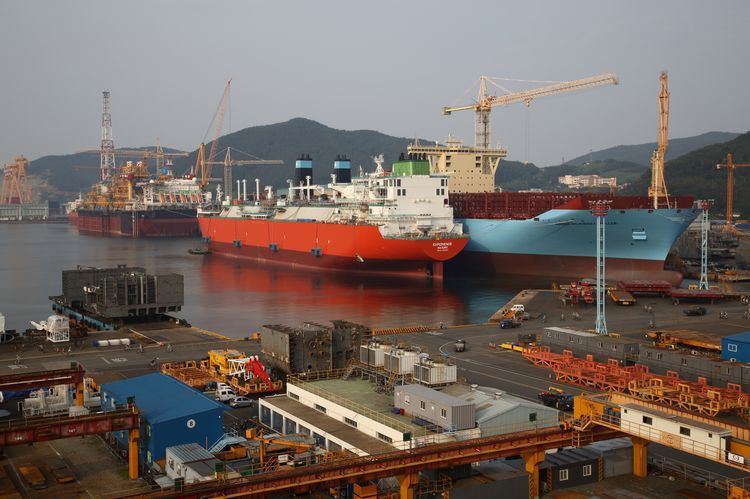
South Korea’s National Pension Service has a decision to make — help the world’s biggest shipmaker survive, or let it die.
Creditors to Daewoo Shipbuilding & Marine Engineering Co. are due to meet next week to decide whether to convert some of the 1.55 trillion won ($1.4 billion) of bonds into equity to help the unprofitable company. Tipping the scale will be the decision of NPS, the biggest holder of debt that matures this month.
“If the National Pension Service doesn’t agree to the debt restructuring plan, then Daewoo Shipbuilding will no longer exist,” said Choi Gwang-shik, an analyst at HI Investment & Securities Co. in Seoul.
It’s the biggest test for South Korea’s lenders after Korea Development Bank, the shipbuilder’s majority shareholder, allowed Hanjin Shipping Co. to collapse last year after refusing to support its debt restructuring plan.
Hanjin’s demise stranded about a hundred container ships around the world and roiled the global supply chain, putting some 11,000 jobs at risk. A Daewoo shutdown could be much worse, jeopardizing up to 50,000 jobs and $34 billion of vessel orders from companies including A.P. Moller-Maersk A/S and Statoil ASA.
“That’s why I think the restructuring plan will go through,” said Choi. “Chances of a recovery would be much greater if the plan is approved.”
The meetings may come down to a face-off between KDB, which owns 79 percent of the shipbuilder, and the state pension fund, which is already embroiled in its own scandal after the arrest of its chairman.
To read about the pension fund scandal in Korea, click here.
KDB and the Export-Import Bank of Korea said last month they would provide 2.9 trillion won in additional loans and swap about 1.6 trillion won of debt for equity if other creditors and bondholders agree to convert up to 80 percent of their debt and extend maturities for remaining loans by as much as five years.
NPS asked the banks to revise the plan, a request that KDB rejected on Monday, according to Joung Young-suk, KDB’s head of corporate restructuring. Daewoo plans to meet bondholders on April 17 and 18, according to regulatory filings. If they fail to agree on a solution, the shipbuilder will be subject to mandatory court receivership and debt restructuring from around April 21, Joung said.
2732%
Daewoo said it had 14.4 trillion won of debt and 224.3 billion won in cash and equivalents as of December. It needs to repay the NPS about 200 billion won, or 45 percent of bonds maturing in April, according to two people familiar with the matter. In total, the company owes NPS 390 billion won through 2019, the people said asking not to be identified as the information isn’t public. Daewoo’s debt-to-equity ratio was 2,732 percent at the end of last year, KDB said in March.
The NPS plans on taking a cautious approach to ensure the longer-term interest of the fund, said an NPS spokesman, who wouldn’t confirm the debt figure the fund holds. Daewoo will do its best to persuade the bondholders to accept the restructuring plan, a company spokesman said by phone.
Four Losses
Daewoo posted its fourth consecutive loss in 2016 as weak oil prices reduced demand for oil tankers and rigs and a surfeit of other vessels curbed demand for new ships. The shipyard could face a cash shortage over the next two years of up to 5.1 trillion won in the current environment, KDB and Export-Import Bank said in a statement last month.
“Creditors’ losses are inevitable,” said Park Jin-young, a credit analyst at HMC Investment Securities Co. in Seoul. “If Daewoo Shipbuilding cannot be revived, then asset sales will start to repay the loans.”
The trouble at South Korea’s biggest shipbuilder is the latest blowup in the beleaguered country, which has been embroiled in a political and corporate meltdown for more than a year.
On Dec. 31, a Seoul court issued a warrant for the arrest of Moon Hyung-pyo, chairman of the NPS, the world’s third-largest pension fund with $456.5 billion of assets. He was suspected of having pressured the fund, when he was a government minister, to support a controversial merger of two companies affiliated to the Samsung Group in 2015. Moon’s lawyer said the chairman denied the allegations, according to reports in Korean media. A spokesman at the Seoul Central District Court said by phone that Moon is currently under a trial over his charges including abuse of authority.
Last month, South Korea’s former President Park Geun-hye was arrested after a court ordered her detention barely three weeks after she was ousted for alleged corruption.